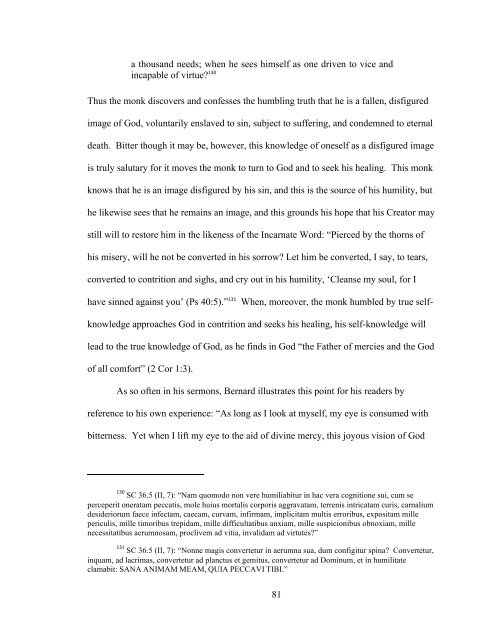MY BELOVED IS MINE AND I AM HIS: SELF-KNOWLEDGE IN THE ...
MY BELOVED IS MINE AND I AM HIS: SELF-KNOWLEDGE IN THE ...
MY BELOVED IS MINE AND I AM HIS: SELF-KNOWLEDGE IN THE ...
You also want an ePaper? Increase the reach of your titles
YUMPU automatically turns print PDFs into web optimized ePapers that Google loves.
a thousand needs; when he sees himself as one driven to vice and<br />
incapable of virtue? 130<br />
Thus the monk discovers and confesses the humbling truth that he is a fallen, disfigured<br />
image of God, voluntarily enslaved to sin, subject to suffering, and condemned to eternal<br />
death. Bitter though it may be, however, this knowledge of oneself as a disfigured image<br />
is truly salutary for it moves the monk to turn to God and to seek his healing. This monk<br />
knows that he is an image disfigured by his sin, and this is the source of his humility, but<br />
he likewise sees that he remains an image, and this grounds his hope that his Creator may<br />
still will to restore him in the likeness of the Incarnate Word: “Pierced by the thorns of<br />
his misery, will he not be converted in his sorrow? Let him be converted, I say, to tears,<br />
converted to contrition and sighs, and cry out in his humility, ‘Cleanse my soul, for I<br />
have sinned against you’ (Ps 40:5).” 131 When, moreover, the monk humbled by true self-<br />
knowledge approaches God in contrition and seeks his healing, his self-knowledge will<br />
lead to the true knowledge of God, as he finds in God “the Father of mercies and the God<br />
of all comfort” (2 Cor 1:3).<br />
As so often in his sermons, Bernard illustrates this point for his readers by<br />
reference to his own experience: “As long as I look at myself, my eye is consumed with<br />
bitterness. Yet when I lift my eye to the aid of divine mercy, this joyous vision of God<br />
130 SC 36.5 (II, 7): “Nam quomodo non vere humiliabitur in hac vera cognitione sui, cum se<br />
perceperit oneratam peccatis, mole huius mortalis corporis aggravatam, terrenis intricatam curis, carnalium<br />
desideriorum faece infectam, caecam, curvam, infirmam, implicitam multis erroribus, expositam mille<br />
periculis, mille timoribus trepidam, mille difficultatibus anxiam, mille suspicionibus obnoxiam, mille<br />
necessitatibus aerumnosam, proclivem ad vitia, invalidam ad virtutes?”<br />
131 SC 36.5 (II, 7): “Nonne magis convertetur in aerumna sua, dum configitur spina? Convertetur,<br />
inquam, ad lacrimas, convertetur ad planctus et gemitus, convertetur ad Dominum, et in humilitate<br />
clamabit: SANA ANIM<strong>AM</strong> ME<strong>AM</strong>, QUIA PECCAVI TIBI.”<br />
81
















